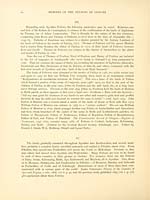Memoirs of the Fultons of Lisburn
(13) [Page 9] - Fulton family
Download files
Complete book:
Individual page:
Thumbnail gallery: Grid view | List view
![(13) [Page 9] - Fulton family](https://deriv.nls.uk/dcn17/9560/95603295.17.jpg)
MEMOIRS OF THE FULTONS OF LISBURN
CHAPTER I
THE FULTON FAMILY
The following preliminary sketch has been compiled from various notes made by Dr.
Robert Valpy Fulton, of Dunedin, N.Z., and other sources.
I.
With regard to the origin of the name, one writer says that Fulton, Fulltown, Fowltown,
Fowlertown, Fullertown, and Fullerton come from a member of the king's household, who in
A.D. 1205 was granted a royal charter by King John, to supply the royal table with game.
There are two probable roots of the name — Fitgl, meaning a bird or fowl, and Ful,
meaning foul, muddy, swampy, etc., the one deriving it from the nature of the locality, the other
from its visitants. The name Fullerton probably had a different origin, from either a fuller, a
cloth-worker, or some Saxon name like Folkher. At any rate, Fulton and its variations are from
very early dates clearly distinguishable from Fullerton, and the former is never found with the
latter in one family.
The Fultons appear to have been of Saxon origin, and at an early date to have migrated
up the east coast, eventually settling in Ayrshire, where to this clay the)- exist in considerable
numbers.
II.
There is, however, reason to believe that the whole of the Fultons did not migrate to
Scotland. It will be seen, in the remarks upon arms farther on, that there were in the time of
the Crusades a certain knight, Sir de Fulton de Holt — presumably the place of that name in
Norfolk — and, in 1604, a Fulton family in Shropshire. There is also the indication, such as it is,
afforded by the charter of King John just mentioned. At the present day, the name is of rare
occurrence in England. Even in London and its suburbs, there are scarcely any outside the
family of Sir Forrest Fulton. It is of course quite possible that the Fultons of Lisburn may
have migrated to Ireland from the southern remnant which evidently still existed early in the
seventeenth century, and the arms they are found using a century later seem to support this
alternative, but on the whole I incline to think that they came from Ayrshire, which we certainly
know did supply to Ulster others of the name.
CHAPTER I
THE FULTON FAMILY
The following preliminary sketch has been compiled from various notes made by Dr.
Robert Valpy Fulton, of Dunedin, N.Z., and other sources.
I.
With regard to the origin of the name, one writer says that Fulton, Fulltown, Fowltown,
Fowlertown, Fullertown, and Fullerton come from a member of the king's household, who in
A.D. 1205 was granted a royal charter by King John, to supply the royal table with game.
There are two probable roots of the name — Fitgl, meaning a bird or fowl, and Ful,
meaning foul, muddy, swampy, etc., the one deriving it from the nature of the locality, the other
from its visitants. The name Fullerton probably had a different origin, from either a fuller, a
cloth-worker, or some Saxon name like Folkher. At any rate, Fulton and its variations are from
very early dates clearly distinguishable from Fullerton, and the former is never found with the
latter in one family.
The Fultons appear to have been of Saxon origin, and at an early date to have migrated
up the east coast, eventually settling in Ayrshire, where to this clay the)- exist in considerable
numbers.
II.
There is, however, reason to believe that the whole of the Fultons did not migrate to
Scotland. It will be seen, in the remarks upon arms farther on, that there were in the time of
the Crusades a certain knight, Sir de Fulton de Holt — presumably the place of that name in
Norfolk — and, in 1604, a Fulton family in Shropshire. There is also the indication, such as it is,
afforded by the charter of King John just mentioned. At the present day, the name is of rare
occurrence in England. Even in London and its suburbs, there are scarcely any outside the
family of Sir Forrest Fulton. It is of course quite possible that the Fultons of Lisburn may
have migrated to Ireland from the southern remnant which evidently still existed early in the
seventeenth century, and the arms they are found using a century later seem to support this
alternative, but on the whole I incline to think that they came from Ayrshire, which we certainly
know did supply to Ulster others of the name.
Set display mode to:
![]() Universal Viewer |
Universal Viewer | ![]() Mirador |
Large image | Transcription
Mirador |
Large image | Transcription
Images and transcriptions on this page, including medium image downloads, may be used under the Creative Commons Attribution 4.0 International Licence unless otherwise stated. ![]()
| Histories of Scottish families > Memoirs of the Fultons of Lisburn > (13) [Page 9] - Fulton family |
|---|
| Permanent URL | https://digital.nls.uk/95603293 |
|---|
| Description | A selection of almost 400 printed items relating to the history of Scottish families, mostly dating from the 19th and early 20th centuries. Includes memoirs, genealogies and clan histories, with a few produced by emigrant families. The earliest family history goes back to AD 916. |
|---|
![[Page viii]List of abbreviations](https://deriv.nls.uk/dcn4/9560/95603283.4.jpg)
